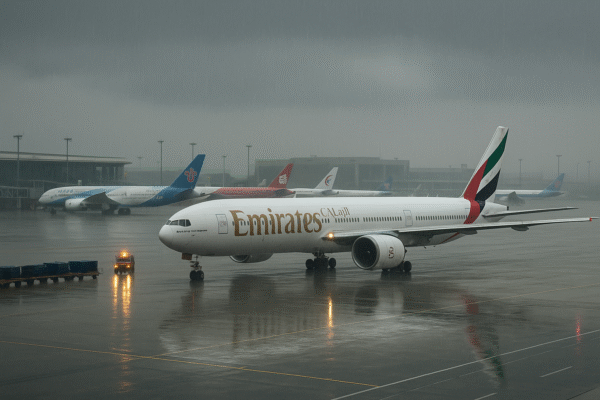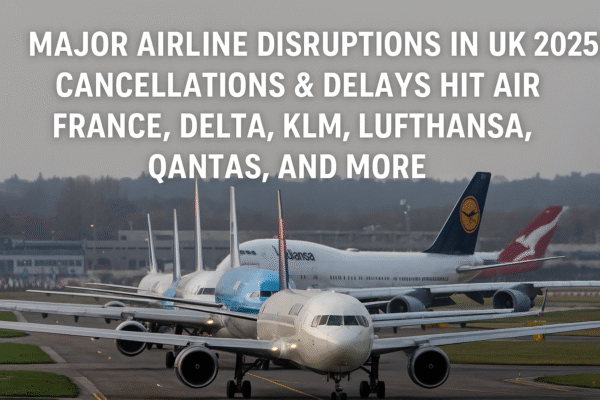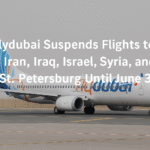The Middle East’s aviation corridors are under severe strain as over 400 flight delays and cancellations hit major airports across Jordan, the UAE, Turkey, Oman, and Israel. Airlines including Emirates, Lufthansa, Ryanair, Qatar Airways, EgyptAir, Air Canada, and Kuwait Airways are grappling with a surge of operational disruptions tied to rising geopolitical tensions between Iran and Israel.
The ripple effect from heightened regional insecurity has choked air traffic at critical transit hubs, forcing airlines to reroute, delay, or cancel flights. Compounded by congested ground operations, airspace detours, and security protocol escalations, the impact has stranded thousands of travelers amid peak summer travel.
Queen Alia International Airport, Amman – 🇯🇴 Jordan
Operations at Jordan’s primary airport came to a halt as 31 flights were cancelled and 29 delayed in just one day. Royal Jordanian, the national carrier, faced the brunt with 15 cancellations and 15 delays, severely affecting its regional connectivity.
European low-cost carriers Ryanair, Buzz, and Wizz Air suspended multiple services—some reporting 100% cancellations—while Oman Air and Saudia cited operational barriers due to diverted airspace.
Minor carriers like Jazeera Airways, Flynas, and Middle East Airlines reported delay rates exceeding 30%. Airport officials described an “operational bottleneck,” as flights waited longer for landing slots and rerouting instructions.
Dubai International Airport – 🇦🇪 United Arab Emirates
Dubai’s flagship hub—DXB—witnessed the highest volume of disruption, with 244 delayed flights and 12 cancellations within 24 hours. Emirates alone reported 91 delays, many of which involved long-haul international routes struggling to navigate compromised Gulf air corridors.
FlyDubai recorded 85 delays, causing cascading issues for onward connections. SpiceJet, IndiGo, Gulf Air, and Air India Express were also significantly impacted.
Legacy carriers including Air France, British Airways, Lufthansa, KLM, Air Canada, and Singapore Airlines each cancelled at least one flight. Kuwait Airways, Air Algerie, and United Airlines followed suit, citing uncertainty over Iran–Israel airspace escalation.
Delays also affected Cyprus Airways, EgyptAir, Qatar Airways, and Wizz Air Malta, intensifying the disruption for both Gulf and Europe-bound passengers.
Istanbul Sabiha Gökçen Airport – 🇹🇷 Turkey
Turkey’s secondary hub in Istanbul reported 15 cancellations and 72 delays, primarily affecting Pegasus Airlines, which grounded 15 services and delayed over 45.
Turkish Airlines and AJet also encountered moderate delays as Turkey, straddling Europe and the Middle East, found itself at the crossroads of rerouted air traffic.
FlyDubai and Smart Lynx flights were delayed amid regional air traffic congestion. Analysts note Istanbul’s proximity to volatile air corridors makes it increasingly vulnerable to flight network stress.
Ben Gurion International Airport – 🇮🇱 Israel
Israel’s primary gateway in Tel Aviv reported 10 flight cancellations and one delay. Wizz Air and Wizz Air UK accounted for nearly all cancellations, halting several services due to airspace instability.
El Al, Israel’s national airline, experienced only a minor delay but has reportedly introduced enhanced routing procedures in response to escalating conflict alerts.
Airport authorities are working with Israel’s civil aviation agency to assess future security measures, particularly for inbound flights from Europe and Asia.
Tensions Between Iran and Israel Escalate Airspace Crisis
The latest wave of travel disruptions is directly linked to deteriorating diplomatic relations and security threats between Iran and Israel. Airlines are increasingly cautious, avoiding airspaces deemed high-risk by aviation regulators such as the FAA, EASA, and ICAO.
Extended flight paths, longer layover times, and overburdened rerouting corridors have compounded delays. Regional carriers are also suffering from crew shortages and logistical breakdowns, with service frequency adjustments happening on a rolling basis.
Summary of Disruption by Airport
📍Amman, Jordan – 31 Cancellations, 29 Delays
- Royal Jordanian, Ryanair, Saudia, Wizz Air, Oman Air, and Buzz among most affected
📍Dubai, UAE – 12 Cancellations, 244 Delays
- Emirates, FlyDubai, Qatar Airways, SpiceJet, Air India Express, Lufthansa, and British Airways affected
📍Istanbul Sabiha Gökçen – 15 Cancellations, 72 Delays
- Pegasus Airlines and Turkish Airlines faced bulk of disruptions
📍Ben Gurion, Israel – 10 Cancellations, 1 Delay
- Wizz Air UK and El Al operating under tight security review
What Passengers Should Know
Passengers traveling through the affected hubs are urged to:
✅ Reconfirm flight status 12–24 hours before departure
✅ Expect longer wait times at transit points
✅ Avoid self-cancellation for higher refund eligibility
✅ Follow airline advisories for schedule updates and rebooking options
As of now, airlines continue to assess risks and adjust routes daily. The global travel industry is on high alert, with the Middle East emerging as a hotspot of aviation unpredictability.
Conclusion
The ongoing wave of flight delays and cancellations—now impacting over 400 services in just 24 hours—demonstrates how quickly geopolitical flashpoints can paralyze international travel. As summer travel demand soars, airlines operating in and around the Middle East face the dual challenge of ensuring safety and maintaining reliable service.
With Iran–Israel tensions likely to remain volatile, experts caution travelers to remain flexible and informed, as the skies over the region remain clouded with uncertainty.
For more travel news like this, keep reading Global Travel Wire
















